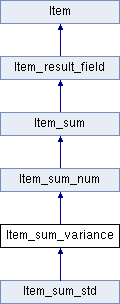|
My Project
|
|
My Project
|

Public Member Functions | |
| Item_sum_variance (Item *item_par, uint sample_arg) | |
| Item_sum_variance (THD *thd, Item_sum_variance *item) | |
| enum Sumfunctype | sum_func () const |
| void | clear () |
| bool | add () |
| double | val_real () |
| my_decimal * | val_decimal (my_decimal *) |
| void | reset_field () |
| void | update_field () |
| Item * | result_item (Field *field) |
| void | no_rows_in_result () |
| const char * | func_name () const |
| Item * | copy_or_same (THD *thd) |
| Field * | create_tmp_field (bool group, TABLE *table) |
| enum Item_result | result_type () const |
| void | cleanup () |
Public Attributes | |
| Item_result | hybrid_type |
| int | cur_dec |
| double | recurrence_m |
| double | recurrence_s |
| ulonglong | count |
| uint | f_precision0 |
| uint | f_scale0 |
| uint | f_precision1 |
| uint | f_scale1 |
| uint | dec_bin_size0 |
| uint | dec_bin_size1 |
| uint | sample |
| uint | prec_increment |
| Field * Item_sum_variance::create_tmp_field | ( | bool | group, |
| TABLE * | table | ||
| ) | [virtual] |
Create a new field to match the type of value we're expected to yield. If we're grouping, then we need some space to serialize variables into, to pass around.
Reimplemented from Item_sum.
| void Item_sum_variance::no_rows_in_result | ( | ) | [inline, virtual] |
Mark an aggregate as having no rows.
This function is called by the execution engine to assign 'NO ROWS FOUND' value to an aggregate item, when the underlying result set has no rows. Such value, in a general case, may be different from the default value of the item after 'clear()': e.g. a numeric item may be initialized to 0 by clear() and to NULL by no_rows_in_result().
Reimplemented from Item_sum.
 1.7.6.1
1.7.6.1